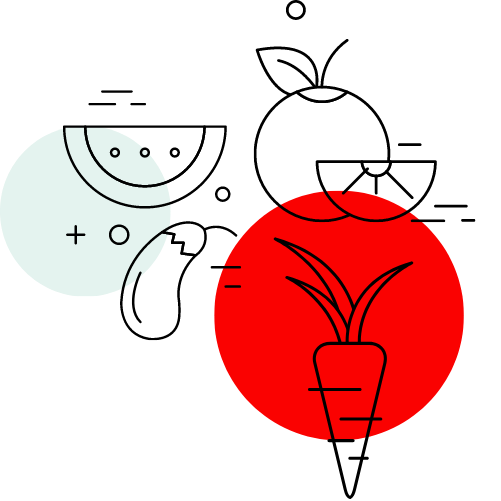Nutrition
BEYOND YOUR DIAGNOSIS
Harnessing the power of a healthy diet
Good food can make you feel great. Embracing a healthy diet after your prostate cancer diagnosis can also help you live well, live longer, and combat some of the unwanted effects of your cancer treatment.
Whether you’re here for yourself or on behalf of a loved one, it is never too late to make a change. That doesn’t mean you need a diet plan. Instead, we want to help you discover how the foods you eat can impact your quality of life – and to inspire you to make small but lasting changes that build habits you can keep. After all, good food should be a source of joy, not a prescription!


HEALTHY CHOICES
Eat well to live well
It doesn’t matter where you are on your journey, making healthy lifestyle choices and eating well with prostate cancer can help:
- Boost your energy levels and increase general health and wellbeing 1
- Maintain a healthy weight and subsequently reduce your risk of other health conditions like diabetes, 2 stroke, 3 high blood pressure, 3 sleep apnoea, 4 and other cancers 5
- Slow disease progression and reduce the likelihood of aggressive prostate cancer 6,7
- Improve your cardiovascular health, 8 protecting you from conditions like high blood pressure and heart disease
- Improve your quality of life 1 and even your life-expectancy 9
Did you know?
Studies have found that men who adopt a healthy diet after a prostate cancer diagnosis live longer than those who consume a ‘Western’ diet 9 – and also enjoy a better quality of life.1 A healthy diet is mostly made up of vegetables, fruits, whole grains, nuts, and fish (as opposed to red and processed meats, high-fat dairy and refined grains like white rice and flour, which make up a ‘Western’ diet).

Information you can trust
With so many opinions out there, it can be hard to know who to follow. At Oncolifestyle we do our best to provide you with evidence-based information that has been carefully researched with your health in mind.
Our sources
Where is this information coming from?
Our sources
Where is this information coming from?
-
- Baguley, B., Bolam, K., Wright, O. & Skinner, T. The Effect of Nutrition Therapy and Exercise on Cancer-Related Fatigue and Quality of Life in Men with Prostate Cancer: A Systematic Review. Nutrients 9, 1003 (2017).
- Wilding, J. P. H. The importance of weight management in type 2 diabetes mellitus. Int. J. Clin. Pract. 68, 682–691 (2014).
- Akil, L. & Ahmad, H. A. Relationships between Obesity and Cardiovascular Diseases in Four Southern States and Colorado. J. Health Care Poor Underserved 22, 61–72 (2011).
- Young, T., Peppard, P. E. & Taheri, S. Excess weight and sleep-disordered breathing. J. Appl. Physiol. 99, 1592–1599 (2005).
- Islami, F., Goding Sauer, A., Gapstur, S. M. & Jemal, A. Proportion of Cancer Cases Attributable to Excess Body Weight by US State, 2011-2015. JAMA Oncol. 5, 384 (2019).
- Castelló, A. et al. Mediterranean Dietary Pattern is Associated with Low Risk of Aggressive Prostate Cancer: MCC-Spain Study. J. Urol. 199, 430–437 (2018).
- Gregg, J. R. et al. Adherence to the Mediterranean diet and grade group progression in localized prostate cancer: An active surveillance cohort. Cancer 127, 720–728 (2021).
- Martínez-González, M. A., Gea, A. & Ruiz-Canela, M. The Mediterranean Diet and Cardiovascular Health: A Critical Review. Circ. Res. 124, 779–798 (2019).
- Yang, M. et al. Dietary Patterns after Prostate Cancer Diagnosis in Relation to Disease-Specific and Total Mortality. Cancer Prev. Res. (Phila. Pa.) 8, 545–551 (2015).
